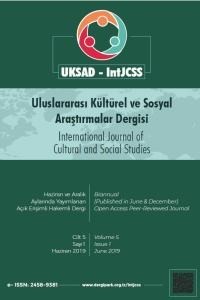Exploring Teachers’ Awareness of the Implementation the Teamwork towards Development Communicative Competencies in the Preschool Groups
___
- Education and Training 2020 Work programme (2012). Thematic Working Group 'Assessment of Key Competencies'; Literature review, Glossary and examples. http://ec.europa.eu/dgs/education_culture/repository/education/policy/school/doc/keyreview_en.pdf.
- Gilleran, A., Kearney C. (2014). Developing pupil competencies through eTwinning. Central Support Service for eTwinning. http://www.cmepius.si/wp-content/uploads/2014/02/EN_Developing-pupil-competences-through-eTwinning.pdf.
- Hoskins, B. & Deakin Crick, R., (2010). Competences for Learning to Learn and Active Citizenship: different currencies or two sides of the same coin? European Journal of Education, Vol. 45, Number 1, March.
- Legendre Marie-Francoise (2008). La notion de competence au coeur des reformes curriculaires: Effet demode ou moteur de changements en profondeur?
- OECD (2009). Creating Effective Teaching and Learning Environments: First results from TALIS. https://www.oecd.org/edu/school/43023606.pdf. Recommendation of the European Parliament and of the Council of 18 December 2006 on Key Competences for Lifelong Learning (2006/962/EC). http://eur-lex.europa.eu/legal-content/EN/TXT/PDF/?uri=CELEX:32006H0962&from=EN
- The definition and selection of key competencies (2005). Executive Summary. OECD. https://www.oecd.org/pisa/35070367.pdf.
- Vuorikari, R. (2012). eTwinning School Teams. Case studies on teacher collaboration through eTwinning. Central Support Service for eTwinning (CSS), Brussels.
- Başlangıç: 2015
- Yayıncı: Mutlu TÜRKMEN
Kocaeli İli Belediyelerinin Stratejik Planlarının Spor Boyutu ile İncelenmesi
Fuat Orkun TAPŞIN, Levent ATALI
Türkiye’de Sporcu Eğitim Merkezleri ve Olimpik Hazırlık Merkezleri
Osman İMAMOĞLU, Ahmet Naci DİLEK, Mutlu TÜRKMEN
Yılmaz ÜNLÜ, Serdar USLU, Murat KUL, Adem SOLAKUMUR, Çetin YAMAN
Gülten İMAMOĞLU, Özlem DEMİRTAŞ
Altay Bölgesi Türk Halklarında Şaman Başlıkları
Spor Federasyonları İl Temsilcilerinin Yönetsel Sorunlarına İlişkin Görüşleri
Hentbolcuların Spora Özgü Başarı Motivasyonu ve Mutluluk Düzeyleri Arasındaki İlişkinin İncelenmesi
Adem ÖZGÜN, Fatih YAŞARTÜRK, Betül AYHAN, Taner BOZKUŞ
Futbolda Dripling ile Sprint Özellikleri Arasındaki İlişkinin İncelenmesi
Cem Sinan ASLAN, Ender EYÜBOĞLU, İzzet KARAKULAK
Türk Töresinin Hazineleri Kutsal Şaman Elbiseleri İkonografisi
